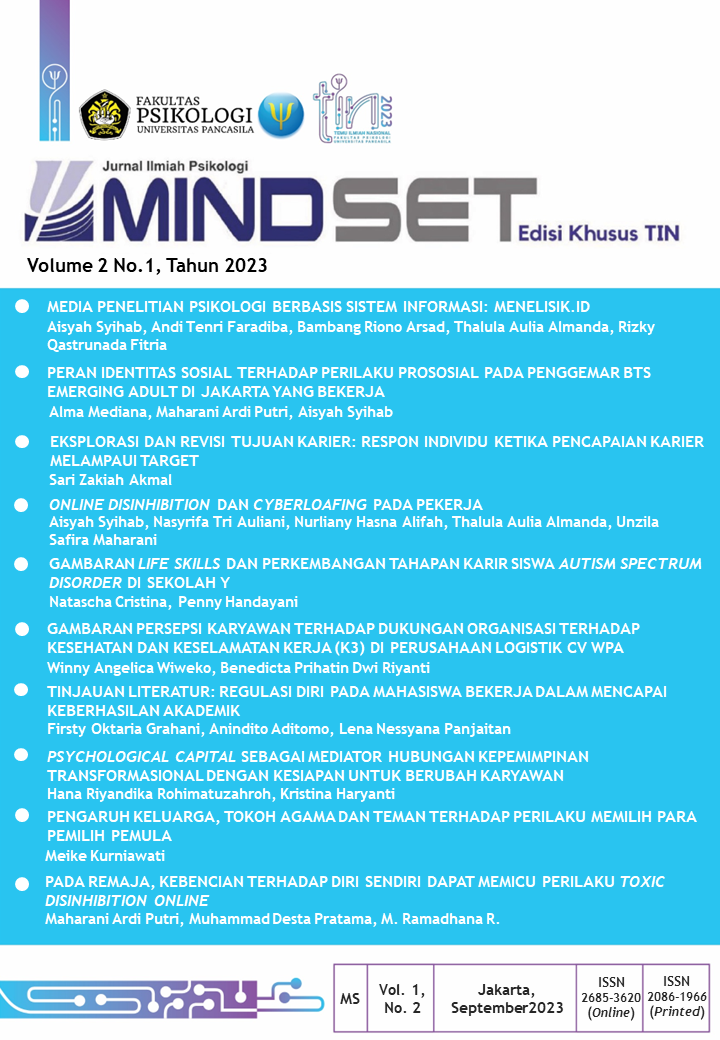Pada Remaja, Kebencian terhadap Diri Sendiri, dapat Memicu Perilaku Toxic Disinhibition Online
DOI:
https://doi.org/10.35814/mindset.v2i01.5530Keywords:
aggresivity, self-hate, teenager, toxic disinhibition onlineAbstract
In the digital era, aggressiveness can be shown in Toxic Disinhibition Online behavior, where people can curse, bully, and pressure their co-stars both verbally and psychologically while online. A lot of people do not realize that the aggressive behavior displayed is influenced by self-hatred, the same goes for Toxic Disinhibition Online's behavior. This study looks at how self-hate can be related to the emergence of Toxic Disinhibition Online behavior. This study looks at how self-hate can be related to the emergence of Toxic Disinhibition Online behavior. Measurements were taken on 115 teenagers who played online games, and used the Online Disinhibition Scale and the Self-Hate Scale. The result is that Self-Hate has an effect of 7.5% on Toxic Disinhibition Online, in a positive direction. This means, when a teenager does not like or hate himself, then there is a possibility that he will display Toxic Disinhibition Online's aggressive behavior when playing online games.
References
Cheung, C. M., Wong, R. Y. M., & Chan, T. K. (2016). Online disinhibition: conceptualization, measurement, and relation to aggressive behaviors.
Dihni, V.A. 2022. Jumlah Gamers Indonesia Terbanyak Ketiga di Dunia. Diambil dari:https://databoks.katadata.co.id/ tanggal 16 Februari 2022.
Hermawati, Setyaningsih, dan Nugraha (2021). Teen Motivation to Create Fake Identity Account on Instagram Social Media. International Journal of Multicultural and Multireligious Understanding. Sebelas Maret University, Surakarta, Indonesia http://dx.doi.org/10.18415/ijmmu.v8i4.2459
Hurlock, E. B. 2012. Psikologi Perkembangan: Erlangga
Joinson, A.N. 1998).“Cause and impication of disinhibited behavior on the Net, In J. Gackenbach (Ed.), Psychology and the internet: intrapersonal, interpersonal, and transpersonal implication (pp.43-60). San Diego, CA: Academic Press
Muhammad, N. 2023. Mayoritas Konsumen Game Online Main Lebih Dari 4 Jam Sehari. Diambil dari: https://databoks.katadata.co.id/ tanggal 15 Juni 2023
Pickhardt, C.E. 2013. Adolescence and Self-Dissatisfaction: Don’t just dismiss self-dissatisfaction as typical teenage angst. Retrieved from: www.psychologytoday.com/ January, 28.
Turnell, Fassnacht, Batterham, Calear, Kyrios. 2019). The Self-Hate Scale: Development and Validation of A Brief Measure and its Relationship to Suicidal Ideation. Journal of Affective Disorders. Vol. 245, 15 February 2019, pages 779-787. https://doi.org/10.1016/j.jad.2018.11.047
Voggeser, B. J., Singh, R. K., & Göritz, A. S. 2018. Self-control in online discussions: Disinhibited online behavior as a failure to recognize social cues. Frontiers in Psychology, 8, 2372












